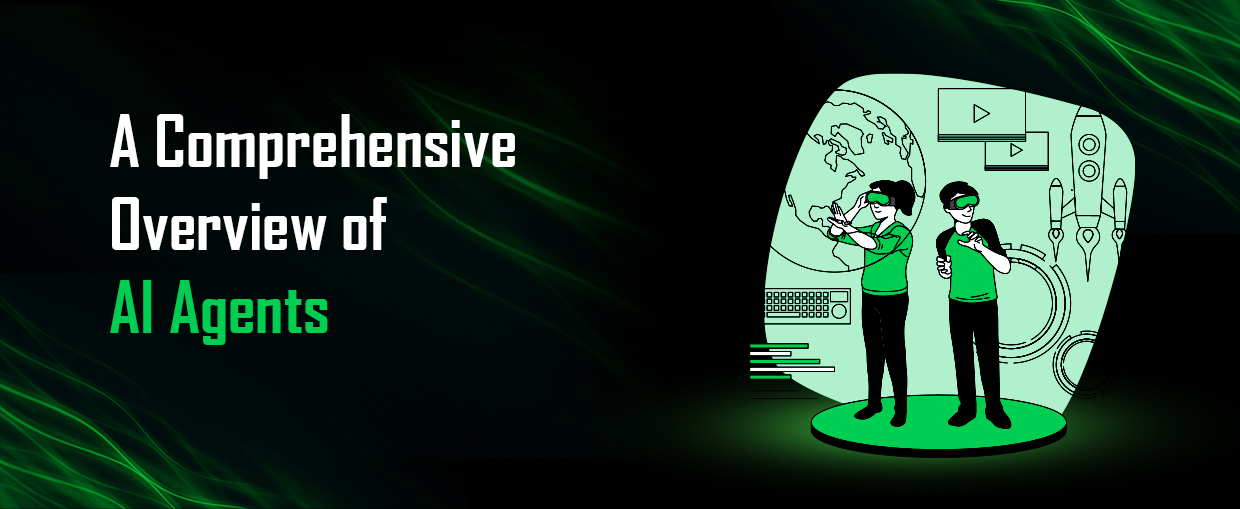Picture an assistant who is always dedicated, eager to learn, and ready to adjust to your requirements. This is what AI agents offer. They can handle mundane tasks and revolutionize complex workflows, reshaping productivity and innovation for future businesses.
By being capable of observing, strategizing, and taking action independently, AI agents usher in a new era of end-to-end transformation across various sectors—enhancing processes, generating valuable data insights, and elevating human capabilities like never before.
Let’s explore AI agents in detail, including how they function, their benefits, various types, and real-world applications.
What are AI Agents?
AI agents, also known as intelligent agents, are software applications powered by artificial intelligence that can operate independently to make decisions and carry out tasks. Their diverse and adaptable abilities enable them to enhance many of today’s conveniences—from basic virtual assistants that respond to common inquiries with pre-set answers, to sophisticated self-driving cars that utilize advanced reasoning techniques and video tracking to navigate through traffic.
Artificial intelligence encompasses computing technologies that can learn, reason, and solve problems, while AI agents specifically apply these capabilities to execute particular functions. In practice, these agents utilize AI-driven models and tools to accomplish set goals with minimal human involvement or supervision.
AI agents vary in their flexibility. The most basic, rule-based AI agents, which have little to no memory, operate under strict conditions. In contrast, more advanced AI agents can handle intricate tasks. They are capable of independently determining actions, creating plans, collecting relevant information, and using various software tools to complete each phase. As they process new information, AI agents continuously enhance their performance—assessing feedback, correcting mistakes, and addressing new challenges. Additionally, multiple AI agents can collaborate, even working alongside humans to complete various tasks.
How do AI Agents Work?
Observe: AI agents are always gathering and analyzing information from their surroundings, which includes user interactions, important performance indicators, and sensor data. They have the capability to remember details from previous conversations, allowing them to maintain context throughout multi-step plans and operations.
Plan: When it comes to planning, these agents utilize language models to independently assess and rank their actions based on their understanding of the issues at hand, the objectives they aim to achieve, the context, and their memory.
Act: In the action phase, AI agents utilize connections with enterprise systems, tools, and data sources to carry out tasks. These tasks are directed by a plan created by either a large language model or a small language model. To complete their tasks, AI agents might tap into enterprise services (like HR systems, order management systems, or CRMs), assign tasks to other AI agents, or seek clarification from users. These intelligent software agents can identify and correct errors, learning from multi-step plans and internal evaluations.
This observe-plan-act cycle is self-reinforcing, as AI agent tools consistently review how the environment has evolved based on previous interactions, enabling them to become more efficient and effective over time.
Benefits of AI Agents
- Boost productivity
AI tools for agents help teams save time by managing the ongoing decisions required for intricate tasks with minimal human involvement, enhancing overall efficiency.
- Reduce Costs
Automating processes with AI agents can significantly lower operational costs by eliminating the expensive inefficiencies and errors associated with manual work.
- Develop Personalized Applications
Organizations can assemble teams of custom agents to carry out specific functions, training them on internal data to produce accurate, personalized results.
- Enhance Accuracy
AI agents can review their own outputs, identifying gaps in information and rectifying mistakes. This capability enables them to uphold high accuracy while speeding up various processes.
- Free-Up Teams
With adaptable agent-driven workflows, AI agents relieve teams from burdensome operational tasks, allowing them to concentrate on strategic investments and innovation.
Types of AI Agents
There are many different types of AI agents, each serving unique purposes. By integrating these agents, organizations can develop tailored multi-agent systems that meet their specific requirements. Here are five types of AI agents:
Reactive agents
Reactive AI agents operate on traditional rule-based frameworks. Often referred to as reflex agents, they can comprehend and respond to prompts based on established rules. This method is particularly effective for repetitive tasks. However, their lack of memory limits them to short-term scenarios. On the upside, reactive agents require minimal maintenance and programming to operate.
Proactive agents
Proactive AI agents are more agile than their reactive counterparts, utilizing predictive algorithms to enhance their functionality. These agents can recognize patterns, anticipate potential outcomes, and determine the optimal course of action without needing human intervention. They are capable of overseeing complex systems, such as supply chains, and can identify problems while suggesting solutions in advance.
Hybrid agents
As the name implies, hybrid agents merge the strengths of both reactive and proactive AI. This combination allows them to respond quickly to predictable situations using preset rules while also adapting to changing conditions when necessary, providing a balanced approach.
Utility-based agents
Utility-based AI agents concentrate on determining the most effective sequence of actions to achieve a desired result. They evaluate each possible action based on user satisfaction criteria and select the one with the highest score. These agents are commonly found in applications like car navigation systems, robotics, and financial trading.
Learning agents
Learning AI agents enhance their performance through past experiences. They employ problem generators to create test scenarios, allowing them to experiment with new strategies and improve over time.
Real-World Applications
Healthcare: In the medical field, AI agents assist doctors in diagnosing illnesses by analyzing medical images. They also create personalized treatment plans for patients and help manage medical records efficiently.
Finance: Financial institutions utilize custom AI agents to detect fraudulent activities and offer personalized financial advice to their clients.
Retail: Retailers can enhance customer service by automating interactions through AI agents. Additionally, AI-driven product recommendations create personalized shopping experiences, boosting sales for businesses.
Manufacturing: AI agents play a crucial role in monitoring equipment to predict maintenance needs and streamline production processes, ultimately increasing productivity and minimizing costly downtimes.
Transportation: In the transportation sector, AI agents are used to operate autonomous vehicles, analyze traffic patterns, and mitigate safety risks. This emerging field has the potential to transform the way we travel.
Marketing: AI marketing agents analyze customer behavior and identify the best communication channels, enabling businesses to design more impactful and personalized marketing strategies.
Data Analysis: Data scientists can leverage AI agents to automate the organization and classification of data, freeing up time to focus on extracting valuable insights from their datasets.
The Wrap
AI agents mark a significant advancement for service organizations by delivering tailored support on a large scale. Companies that adopt this technology will be in a position to cut expenses while satisfying the needs of today’s customers in a competitive landscape. You can leverage the benefits of AI agents for your business by partnering with an experienced and reliable AI development company offering top-notch artificial intelligence development services.



